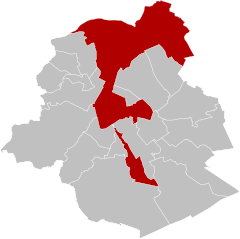City of Brussels
| |
|---|---|
City and municipality | |
 Panorama of the city centre from the Mont des Arts/Kunstberg | |
| Coordinates: 50°50′48″N 04°21′09″E / 50.84667°N 4.35250°E | |
| Country | |
| Community | Flemish Community French Community |
| Region | Brussels-Capital |
| Arrondissement | Brussels-Capital |
| Government | |
| • Mayor (list) | Philippe Close (PS) |
| • Governing party/ies | PS - Ecolo / Groen, DéFI - Forward |
| Area | |
• Total | 33.09 km2 (12.78 sq mi) |
| Population (2022-01-01)[1] | |
• Total | 188,737 |
| • Density | 5,700/km2 (15,000/sq mi) |
| Postal codes | 1000, 1020, 1030, 1040, 1050, 1120, 1130 |
| NIS code | 21004 |
| Area codes | 02 |
| Website | www.brussels.be |
The City of Brussels[a] is the largest municipality and historical centre of the Brussels-Capital Region, as well as the capital of the Flemish Region (from which it is separate) and Belgium.[2] The City of Brussels is also the administrative centre of the European Union, as it hosts a number of principal EU institutions in its European Quarter.[3][4][b]
Besides the central historic town located within the Pentagon, the City of Brussels covers some of the city's immediate outskirts within the greater Brussels-Capital Region, namely the former municipalities of Haren, Laeken, and Neder-Over-Heembeek to the north, as well as the Avenue Louise/Louizalaan and the Bois de la Cambre/Ter Kamerenbos park to the south-east, where it borders municipalities in Flanders.
As of 1 January 2023[update], the City of Brussels had a population of 194,291 inhabitants. The total area is 33.09 km2 (12.78 sq mi) which gives a population density of 5,704/km2 (14,770/sq mi). As of 2007, there were 75,998 registered non-Belgians in the City.[5] In common with all of Brussels' municipalities, it is legally bilingual (French–Dutch).
- ^ "Bevolking per gemeente op 1 januari 2022". Statbel.
- ^ The Belgian Constitution (PDF). Brussels, Belgium: Belgian House of Representatives. May 2014. p. 63. Archived from the original (PDF) on 10 August 2015. Retrieved 10 September 2015.
- ^ Demey 2007.
- ^ "Protocol (No 6) on the location of the seats of the institutions and of certain bodies, offices, agencies and departments of the European Union, Consolidated version of the Treaty on the Functioning of the European Union, OJ C 83, 30.3.2010, p. 265–265". EUR-Lex. 30 March 2010. Archived from the original on 8 July 2012. Retrieved 3 August 2010.
- ^ "Immigration Office | IBZ".
Cite error: There are <ref group=lower-alpha> tags or {{efn}} templates on this page, but the references will not show without a {{reflist|group=lower-alpha}} template or {{notelist}} template (see the help page).




